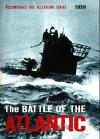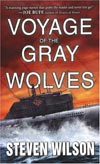The Battle of The Atlantic
Williams, Andrew
2002, BBC Worldwide Ltd
ISBN 056353429X
Hardcover, 304 pages, b&w /color photos
| Type. | Campaign history: Companion book to 2002 BBC-TV series |
| Pros. | Well researched, brilliant balance of historical overview, eyewitness experiences of all sides |
| Cons. | Compresses last 2 years of campaign into two final chapters |
| Rating. |  |
 Andrew Williams’ brilliant account emphasises both the centrality and forgotten nature of the campaign, and is one attempt among many, with the TV series, to redress this imbalance. It is not merely a solid account, it is also very well written, entertaining, careful, and detailed. Many general campaign histories are mundanely written, or melodramatic in order (they think) to hold the reader. This book carries you, conventionally, from Athenia to surrender, chronologically while not boring or even succumbing to reeling off one convoy loss disaster after another. It takes up controversy and dispute among historians, recognising there are books and schools of thought, not just events and experiences. This rounding of the story, going beyond what merely happened, is one such way of enlivening and renewing the material. It does not feel like a very ploughed field, with hundreds of predecessors, at all. To a jaded reader, veteran of those hundreds, it has the freshness of approach, and new material, to hold and excite the reader. It has many excellent photographs, both classic images and unpublished personal pix, and one rather limited, if clear map. With a map of a campaign as vast as the Atlantic, it is always well to limit yourself to one basic map, otherwise you have to go into detail with a dozen. If there is anything wrong with the photos, it is that there are too few of aircraft, and other key elements - radar, Ultra and Bletchley, Leigh Light, Liberty Shipyards, and the other war-winning elements. These technologies, and mass-production are mentioned, but not focussed upon.
Andrew Williams’ brilliant account emphasises both the centrality and forgotten nature of the campaign, and is one attempt among many, with the TV series, to redress this imbalance. It is not merely a solid account, it is also very well written, entertaining, careful, and detailed. Many general campaign histories are mundanely written, or melodramatic in order (they think) to hold the reader. This book carries you, conventionally, from Athenia to surrender, chronologically while not boring or even succumbing to reeling off one convoy loss disaster after another. It takes up controversy and dispute among historians, recognising there are books and schools of thought, not just events and experiences. This rounding of the story, going beyond what merely happened, is one such way of enlivening and renewing the material. It does not feel like a very ploughed field, with hundreds of predecessors, at all. To a jaded reader, veteran of those hundreds, it has the freshness of approach, and new material, to hold and excite the reader. It has many excellent photographs, both classic images and unpublished personal pix, and one rather limited, if clear map. With a map of a campaign as vast as the Atlantic, it is always well to limit yourself to one basic map, otherwise you have to go into detail with a dozen. If there is anything wrong with the photos, it is that there are too few of aircraft, and other key elements - radar, Ultra and Bletchley, Leigh Light, Liberty Shipyards, and the other war-winning elements. These technologies, and mass-production are mentioned, but not focussed upon.
Service at sea, at and under the surface, as well as seamen and losses, are emphasised at the expense of the technologies and adaptive improvements that allowed them to survive, and not have to go on sacrificing theselves. As Williams points out, mere sacrifice was not enough for any participants. It is the service, collapse and sacrifice of the U-Boat force, and its men, which becomes emphasised. Text and images both reflect the change the U-Boat men underwent from dominance over to subservience to Allied tactics, technology, and leadership, and the relentless pressure of the tonnage war and the sacrifice it demanded. It is excellently and authoritatively sourced, with an effective blend of omniscient narrative, secondary sources, primary reports and sources, and eyewitness accounts.
The Canadian contribution is mentioned, but not emphasised, as are the failures and limitations of USN Adm King and the fleet officers who did not oppose and examine the admittedly minor, ad hoc Drumbeat offensive of 1942. It is a little too British, even given its BBC origin, for the truly international audience the makers must be aware they are selling to.
Despite its faults, Williams still manages to strike a balance in coverage between men’s stories and the larger picture. He has to confront the scale and width of the campaign in a single volume and a remarkably brief text - only 288 pages plus sources and footnotes. He strikes a very good balance between the different services and nations, between Western Approaches Command, the MN, U-Boat Command, RAF Coastal Command, and their scientific services. He doesn't make, as many TV series do, too much of personal recollections and unalloyed memory. These can often be overbearing, melodramatic: too much caught in the spirit of the event, rather than a perspective on it. These are men who have since thought about their experiences. There is a place for actual measured tranquil recollection and historical analysis. Without these it would be merely an oral history, a sum of biassed recollections. He also manages to strike a balance in portraying and analysing the strategy, tactics, and personalities.
He neither excoriates nor romanticises Churchill, Horton, King or Dönitz. They all had their faults, and qualities. Williams can still criticise King and his staff for ignoring convoy in favour of patrols, of the general dismissal of RN experience painfully bought. He can also still criticise Dönitz for sacrificing his men in the last two and a half years of the war. He also, more usefully, analyses the U-Bootwaffe and Dönitz’s command style. He found it to be accidental, unimaginitive, ad hoc, understaffed and under-supported. It reacted to change by shifting resources to the softest targets and the easiest places - like Drumbeat - until there were none left, the Allies had caught up technically, closed all the gaps, and the tide turned entirely against the Germans. Williams points out that U-Boat HQ had six officers and a handful of communications ratings. Under Dönitz these were confronted with a vast operational and research staff of more than 10,000 in Western Approaches by war’s end. Dönitz and his staff were also not connected to and supported by their technical specialists. Unlike in Britain and America, they were not considered important, they were civilians, scientists, not soldiers, warriors, martial. This gap in strategic vision, technological innovation and adaptability is the chief cause of Germany’s defeat, along with blindness to the penetration of Enigma, and the simple pressure of war.
Williams however criticises Dönitz for compressing the last two years of the war into 25 of the 500 pages of his memoirs, while Williams himself contracts those last two years into two chapters named Collapse and Sacrifice. In these, the experiences and operations of escort and merchant seamen were hardly seen, compared to those of the U-Boat men, both ashore and the few survivors at sea. As in so many books, focus shifts to merely one side, without explaining the opposition’s success and strengths. As in so many accounts, the hard fighting of the last two years is compressed into paragraphs summarising each failed offensive and its losses, while not exploring in more detail the experiences and attitudes of other groups: those who weren’t getting attacked and killed. While this has little effect on the outcome, it does contribute to an unevenness in the book, and presumably in the TV series. It is no longer the Battle of the Atlantic, it is now the operations and suffering of the U-Boat force. Against this shift and lack of detail, statements that the campaign lasted until the very last days of the war, and that it was an unbroken and continuous struggle, while true, ring rather empty.
It is a disappointment that an otherwise fine account, with so much authoritative sourcing and such a solid balance elsewhere through the text, falls where so many others have, in not covering the campaign evenly to the end. There is enough new information, enough current interviews by ordinary participants, enough visits to places, such as Dönitz’s old HQ at Kernevel in Lorient, and analysis of his team’s shortcomings, to make this a brilliant account. Had he added a chapter to balance the mis-step in coverage, and included more material on the Allies 1943-45, it would have been perfect.
The reviewer welcomes your comments on this review.
Review written by Ian Campbell, Launceston, Tasmania.
Published on 4 Jul 2003.
This title is highly recommended.
Purchase information: (info) Get The Battle of The Atlantic now at amazon.co.uk
Get The Battle of The Atlantic now at amazon.co.uk
Return to our main review page.



